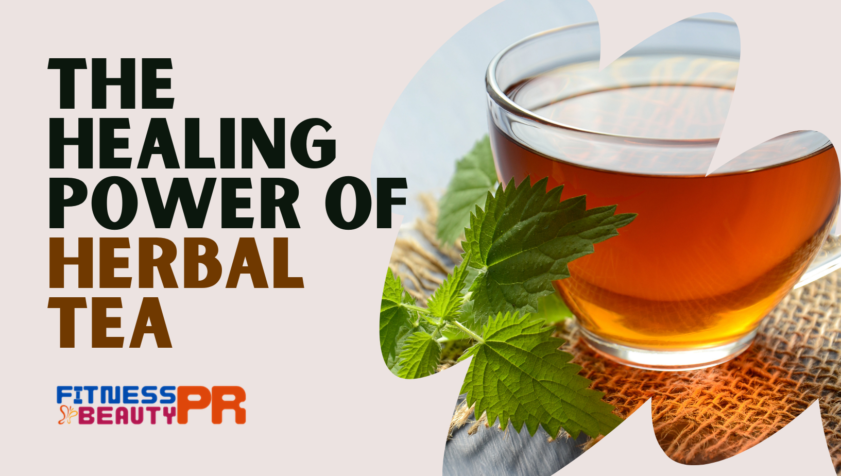What benefits can you reap from herbal tea? Discover the simple answer in this straightforward guide about herbal teas and their advantages for your health. Go beyond the taste and learn why these caffeine-free infusions may be the soothing, therapeutic addition you need in your daily routine. Expect to find clear, actionable information on the most popular and lesser-known herbal teas, their roles in traditional medicine, and practical tips on integrating them into your lifestyle.
Key Takeaways
-
Herbal teas, free from caffeine and derived from various plants, fruits, and spices, have been utilized in traditional medicine across cultures for their diverse health benefits, such as reducing free radicals and stress and preventing cardiovascular diseases.
-
Popular herbal teas like chamomile, peppermint, and ginger each bring unique health benefits, including enhancing sleep quality, providing digestive relief, and boosting immune function, respectively, backed by specific compounds like apigenin in chamomile and gingerol in ginger.
-
Careful consideration is necessary when incorporating herbal teas into your diet due to potential sugar content, allergic reactions, and interactions with medications; consultation with healthcare professionals is recommended, especially when on prescribed drugs.
The World of Herbal Teas
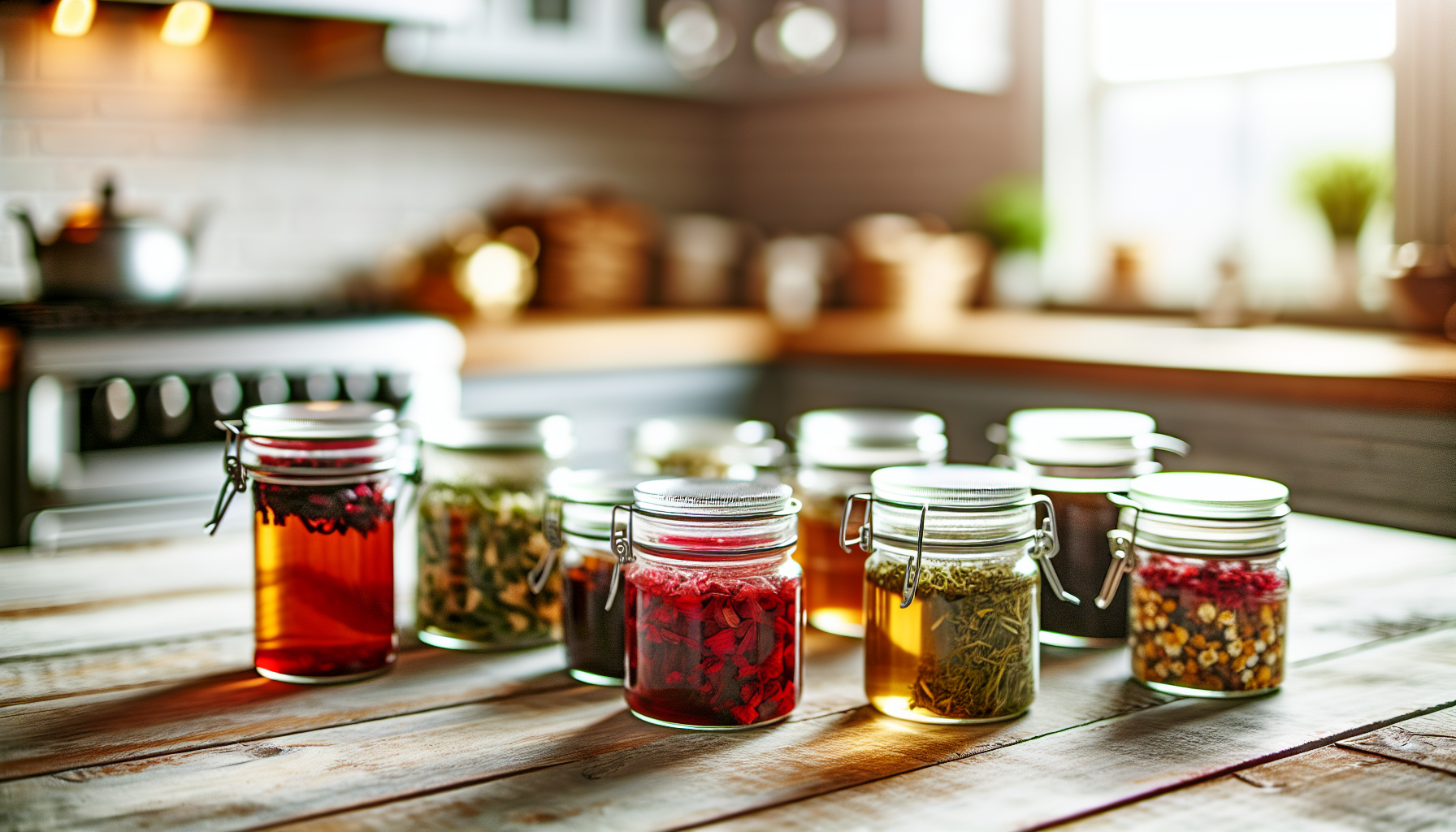
The world of herbal teas is a fascinating and diverse one, ranging from aromatic chamomile to invigorating green tea. These teas have been used in traditional herbal medicine for centuries across various cultures, showcasing the power and importance of natural remedies derived from plants, fruits, and spices. Whether tracing back to ancient dynasties in China or medieval apothecaries in Europe, these brews hold an esteemed place as essential tools for healing.
In contrast to their caffeine-containing counterparts like green and black teas, and oolong tea, the beauty of herbal teas lies in their lack of caffeine content. This makes them a preferable choice for individuals looking to limit their caffeine intake while still reaping potential health benefits. These benefits range from neutralizing free radicals to alleviating stress, and even preventing cardiovascular disease. Needless to say, the use and production of many types of herbal teas stem from skillful selections of specific leaves taken carefully from the ever-versatile tea plant.
What are Herbal Teas?
Distinguishing between herbal teas and true teas, like black or green tea, may not be initially clear. The main difference lies in the leaves used to brew them – while true teas come from the Camellia sinensis plant, herbal varieties use a mixture of plants, fruits and spices for unique flavors and health benefits.
The process of creating an herbal tea involves infusing dried herbs or other ingredients into hot water before extracting them and adding sweeteners if desired. This can result in a range of sensory experiences. Floral chamomile notes to spicy ginger kick, refreshing hibiscus taste as well as delicate white tea subtlety are all examples showcasing how there is something for everyone’s palate when it comes to this type of beverage.
Whether served warm or cold (as iced tea), each cup offers a journey through flavor profiles due to its diverse blend options, including various types such as camellia sinensis derived ones like traditional black or green alternatives along with intriguing combinations containing healthy additions such as spice filled mixtures consisting of flowers/plant-fruit hybrids sourced from nature itself. With so many different choices available within these delightful beverages, one could only imagine where their taste buds might take them next!
The Role of Herbal Teas in Traditional Medicine
Herbal teas hold a significant place in history as they have been used for centuries across different cultures and traditional medicine practices. These natural brews are not just beverages but also serve as an ancient tradition, carrying the wisdom of our ancestors. In various forms of traditional medicine like Ayurveda, Traditional Chinese Medicine, and Native American medicine, herbal teas have been known to provide remedies for ailments such as headaches, fevers, and digestive issues while promoting overall health.
The consumption of herbal teas has endured over time due to the numerous health benefits recognized by these medicinal traditions. They are known for their ability to induce relaxation and aid digestion while enhancing organ function and balancing metabolic processes according to Ayurvedic principles. Likewise, in TCM, it is believed that these teas can balance yin-yang energy, which results in improved physical well-being. Even Native Americans valued the healing properties found within herbs, often using them medicinally against stomach discomforts or fever symptoms, proving that herbal tea’s popularity persists to this day, with people showing increased interest in understanding more about their potential advantages.
The Health-Boosting Properties of Popular Herbal Teas
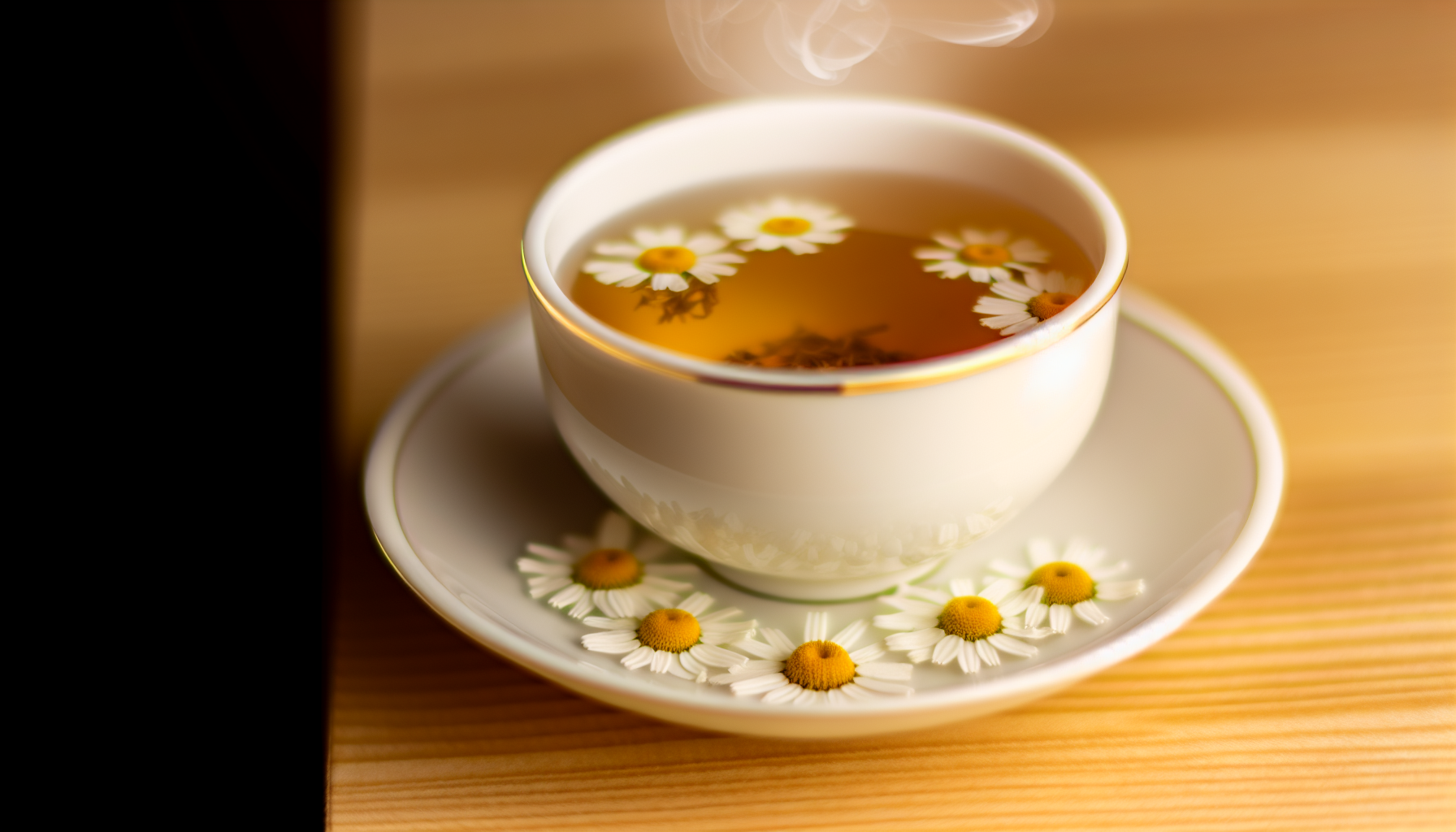
Herbal teas have been enjoyed for centuries not only for their delicious taste but also because of the numerous health benefits they provide. Let’s take a closer look at some well-known herbal teas like chamomile, peppermint, and ginger to discover their unique abilities in promoting better sleep, aiding digestion, and boosting immune function. These tea varieties are packed with powerful health-boosting properties that make them highly sought after by many individuals seeking to improve their overall well-being.
Chamomile Tea: Sleep and Relaxation
Chamomile tea, with its delicate floral notes, is a beacon of tranquility in your teacup. Renowned for its calming effects, chamomile tea does more than soothe your senses. Drinking this herbal tea can enhance sleep quality, alleviate stress, and reduce anxiety. These relaxing properties can be attributed to active compounds found in chamomile, such as apigenin, quercetin, and other flavonoids.
The reputation of chamomile tea as a sleep inducer and relaxant is further reinforced by empirical studies. The flavonoid apigenin in chamomile interacts with benzodiazepine receptors in the brain, promoting sleep and relaxation. For optimal results, it is advisable to sip on chamomile tea 30 to 45 minutes before bedtime.
Consuming two to three cups a day regularly can assist in unwinding after a long day and securing a peaceful night’s sleep.
Peppermint Tea: Digestive Relief
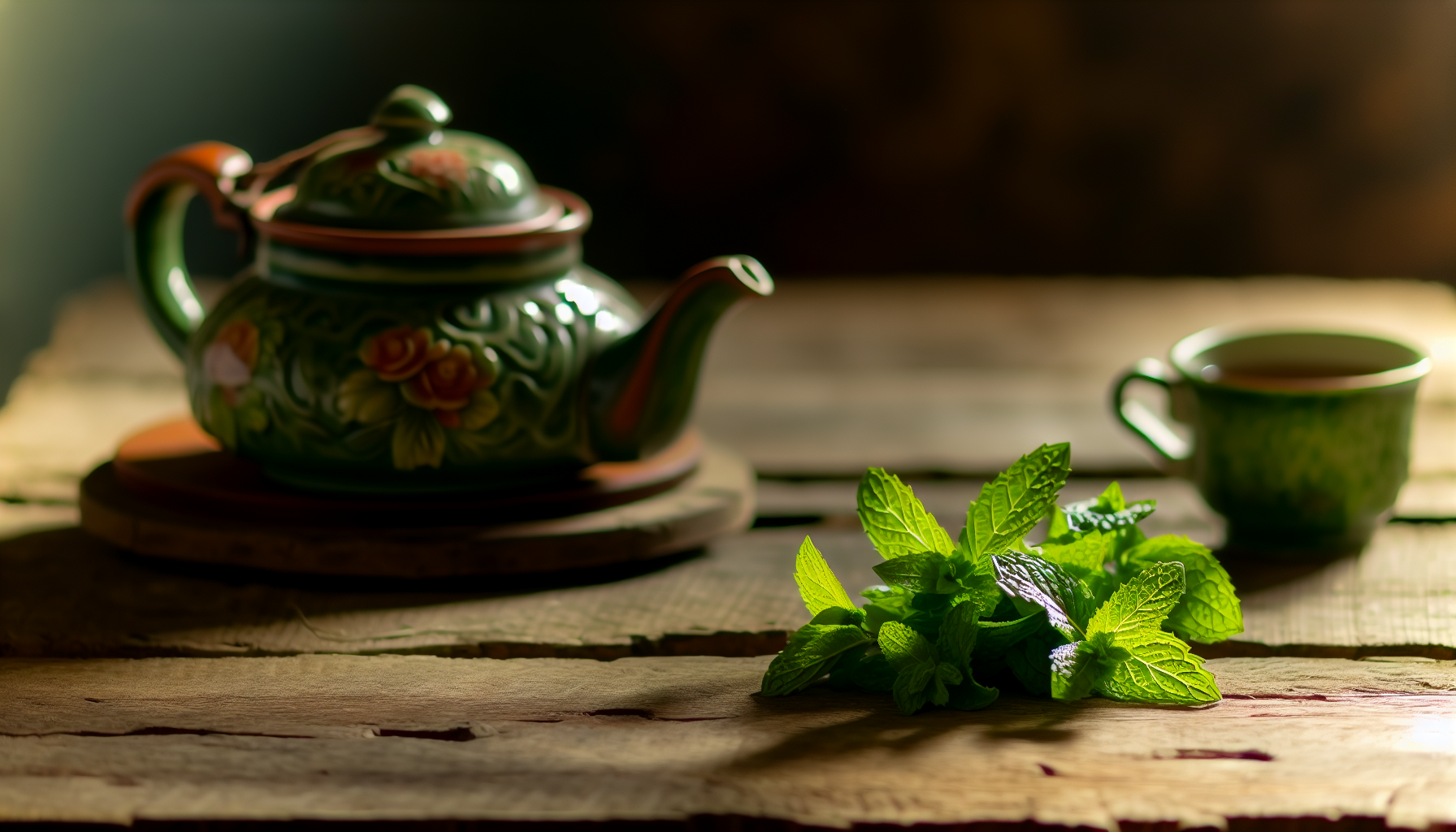
Herbal peppermint tea is known to provide a refreshing boost to your digestive system. Its cooling and calming properties are beneficial in easing common symptoms such as bloating, gas, and indigestion. The active ingredient found in peppermint oil called menthol plays a crucial role in its soothing effects on the digestive system.
Peppermint tea not only offers relief from mild digestive discomforts but also proves effective against more severe symptoms like stomach pain and nausea by promoting relaxation of gastrointestinal muscles. It serves as an essential natural remedy for individuals experiencing various forms of digestion-related distress.
Ginger Tea: Immune Support and Inflammation Reduction
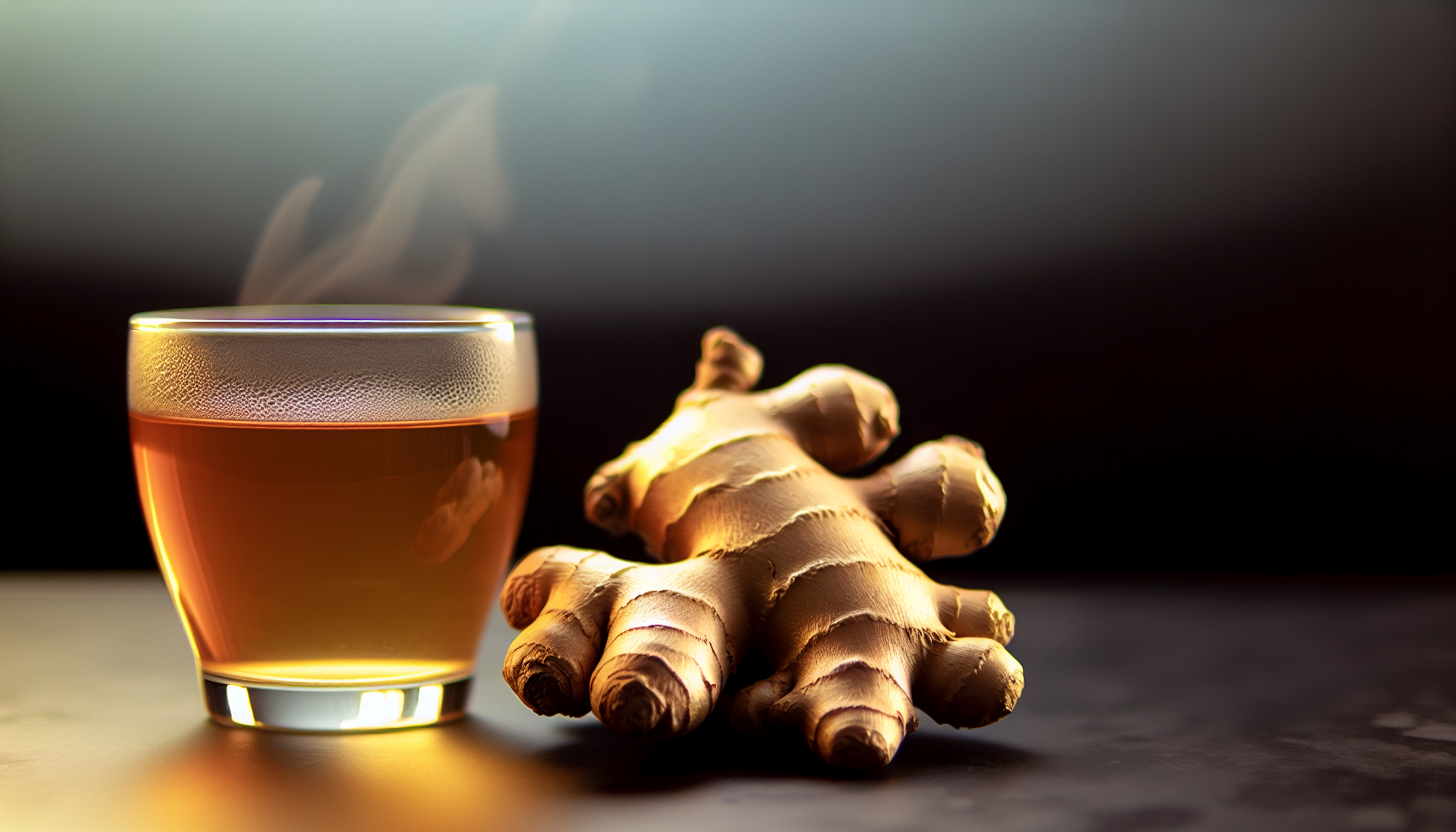
Ginger tea is not just a delicious drink, but it also provides numerous health benefits due to its spicy taste and warming qualities. It contains gingerol, which has powerful anti-inflammatory and antioxidant effects that can help alleviate muscle pain and boost the immune system.
While incorporating ginger tea into your daily routine can provide immunity-boosting advantages, it’s important to be aware of potential side effects. Excessive consumption may result in heartburn, diarrhea, or stomach discomfort. Moderation is crucial when drinking this beverage regularly. Always pay attention to how your body responds when introducing ginger tea into your diet.
Lesser-Known Herbal Teas with Surprising Benefits
While chamomile, peppermint, and ginger may steal the spotlight in the world of herbal teas, many other lesser-known varieties are waiting to be explored. Each has its own distinctive flavors and potential health benefits that should not be overlooked. Some examples include oolong tea, rooibos, lemon balm, and passionflower – all offering unique surprises for one’s well-being. So, while we continue to enjoy our beloved teas like ginger or go-to options such as chamomile or peppermint tea, it is worth considering adding these under-the-radar options into our regular rotation for a more diverse range of healthful advantages.
Rooibos Tea: Allergy Relief and Heart Health
Originating from South Africa, rooibos tea is a vibrant and distinct brew that offers more than just its unique taste. This type of tea contains powerful antioxidants, which can potentially help regulate blood sugar levels, support cardiovascular health, improve digestion, and promote skin wellness.
One surprising benefit of rooibos tea is its ability to inhibit the release of histamine in the body. This means it may offer relief for allergy sufferers. If you’re looking to include this beverage into your daily routine, keep in mind its potential benefits for heart health as well. Rooibos has been shown to positively impact both blood pressure and cholesterol levels, leading to overall improved cardiovascular function. For best results when aiming to lower blood pressure with rooibos tea, intake should be about 4-6 cups per day.
Being rich in flavor, studies have also linked regular consumption of rooibos tea with numerous advantages related to overall health, such as promoting good circulation within arterial walls all over one’s body, including those arteries surrounding our hearts. This allows for healthy regulation processes tied directly to reducing the possibility of negatively impacting pressure on the cardiac system. By incorporating 4-6 cups or moderate amounts each day, satisfying these recommendations could lead to great improvement.
Lemon Balm Tea: Mood Enhancement and Antioxidant Boost
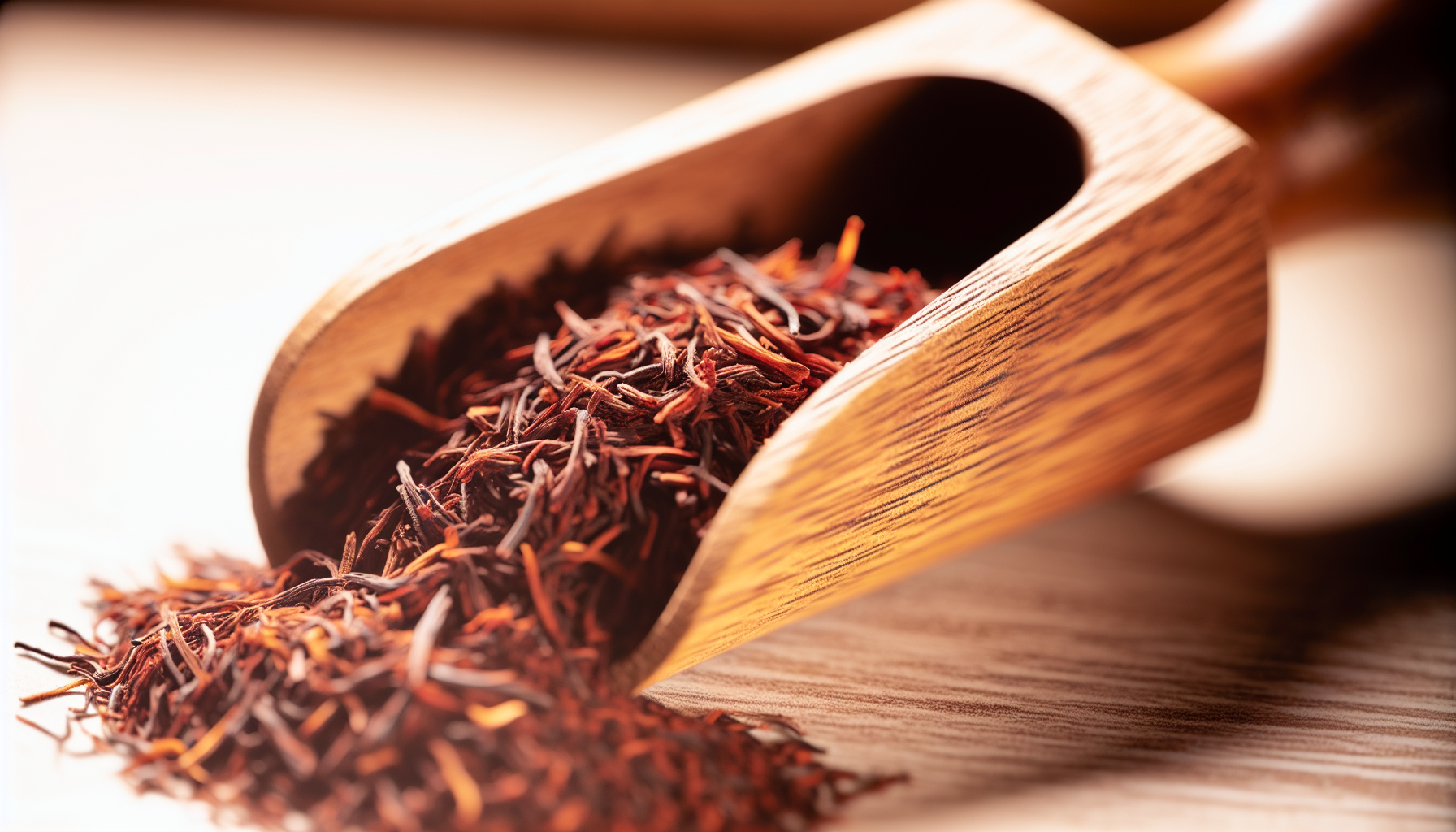
Lemon balm tea is a well-kept secret among herbal teas, known for its calming effects that can help boost mood, reduce anxiety, and increase antioxidant levels. Its ability to potentially improve cognitive function and sleep quality has also been recognized, making it an excellent choice for an evening beverage.
Indulging in a cup of lemon balm tea not only allows you to enjoy the delightful citrus flavor but also provides numerous health benefits. It contains high amounts of phenolic compounds and rosmarinic acid, which have powerful antioxidant properties that may enhance mood and cognitive performance. Like other herbal teas, it’s important to be cautious about potential side effects such as increased appetite, nausea, or dizziness.
Passionflower Tea: Anxiety Relief and Improved Sleep
Herbal teas are known for their unique taste and potential benefits. Passionflower tea, in particular, has been recognized for its ability to reduce anxiety and promote better sleep due to compounds like GABA, flavonoids, and indole alkaloids.
Studies have shown that passionflower tea can be an effective natural remedy for those experiencing anxiety or struggling with insomnia. As with any herbal supplement, it’s important to take note of possible side effects such as drowsiness or confusion. Before incorporating new herbal teas into your routine – especially if you’re taking other medications – consult a healthcare professional first.
Precautions and Considerations When Choosing Herbal Teas
While herbal teas do offer many advantages for our well-being, it is crucial to have a knowledgeable approach to them. It should be noted that not all herbal teas are alike, and one must also take into consideration potential risks such as artificially sweetened “herbal” beverages, allergies, and any possible interactions with medications.
Avoiding Sugary “Herbal Teas”
While herbal teas can be a healthier alternative to drinks with high sugar content, not all of them are as innocent. There are some herbal teas on the market that have added sugars, which may diminish their potential health benefits. It is vital to carefully examine both the ingredient list and nutritional information when selecting an herbal tea.
Consuming sugary types of this beverage could lead to significant negative effects on one’s well-being, including damage across multiple organs. True authentic versions made from pure plants without any additional sweeteners or artificial flavors offer natural advantages typically associated with these types of tea products. As such, it would always be wise to choose options free from extra sugar and artificial flavorings for maximum health benefits.
Allergies and Sensitivities
While tea allergies are uncommon, it is possible to have sensitivities or allergies specifically to certain components in herbal teas. One particular ingredient often associated with allergic reactions is chamomile tea. It’s crucial for individuals to be aware of their potential allergens and carefully review the ingredient labels on any herbal teas they consume.
If symptoms such as redness, itching, hives, tongue swelling, throat tightness, dizziness or nausea occur after consuming a herbal tea product, it may indicate an allergy to one of its ingredients. While some people might already know about their specific sensitivities, it remains vital that they avoid drinking any tea containing these triggers.
To mitigate risks when trying out new types of herbal teas, sample just small quantities first to monitor your body’s response before adding them regularly into your diet.
Interactions with Medications
The consumption of certain herbal teas can potentially cause interactions with medications, which may result in changes to the effectiveness or undesirable side effects. For example, chamomile tea has been found to reduce the absorption of some oral drugs and enhance their effects on specific medicines. Similarly, ginger tea could interact with medication that slows down blood clotting, increasing the risk for bruises and bleeding.
In order to ensure safe enjoyment of the numerous health benefits offered by herbal teas, it is always recommended to consult a healthcare professional before incorporating them into your daily routine, especially if you are taking prescribed medications. By doing so, you can prevent any unwanted interactions and continue reaping from these natural remedies without compromising your well-being.
How to Incorporate Herbal Teas into Your Daily Routine
Equipped with knowledge about the herbal tea industry, it is now time to prepare a cup of your own! Adding herbal teas into your daily routine can be an effortless and enjoyable way to improve your overall well-being. Whether you are an experienced tea drinker or new to the realm of herbal brews, here are some tips that will help get you started on this journey.
Experimenting with Flavors and Blends
The variety of herbal teas is one of the many delights they offer. With an array of flavors and combinations to choose from, there’s always a new blend waiting to be discovered. Don’t hesitate to experiment with different types and blends of herbal tea, as it can lead you on a journey through endless possibilities.
Some popular options among tea lovers include chamomile for its calming effects and floral notes, peppermint for its refreshing taste and digestion benefits, rooibos which is caffeine-free but rich in antioxidants due to its earthy tones, and lavender known for promoting relaxation.
Don’t limit yourself to pre-made blends. Creating your unique mixture can be both fun and rewarding! To begin this process:
-
Become familiar with each type’s flavor profile.
-
Combine various herbs until you reach the desired taste.
-
Continue adjusting the recipe until it pleases your palate – after all, the goal here is simply enjoying what you’re drinking!
In conclusion, you have access not just to top-quality ingredients, but also imagination-only horizons that await exploration. Trust me, your senses will thank us later so start now. Yummi-ness begins right at home. Welcome to discovering real happiness…through natural aromas sipped gently by candles lit. Make peace & little joys reign.
Replacing High-Caffeine Beverages
For individuals looking to decrease their caffeine consumption, herbal teas offer a great alternative to high-caffeine drinks such as coffee and black tea. While true teas are derived from the Camellia sinensis plant, herbal teas do not contain any caffeine naturally, making them a healthier choice for those who are sensitive to its effects.
When swapping out high-caffeine beverages with herbal teas, it is important to consider your taste preferences. If you prefer the bold flavor of coffee, then robust-tasting herbs like rooibos or hibiscus may be more enjoyable for you. Conversely, if you appreciate lighter and aromatic flavors similar to green tea’s delicate profile, chamomile or peppermint might suit your palate better among other mild-flavored herbals available.
Creating Relaxing Habits
Aside from providing necessary hydration, consuming herbal tea can also offer a serene and peaceful break in your day. By incorporating a soothing ritual around drinking herbal tea, you can effectively reduce stress levels and promote overall well-being. Whether it’s kickstarting your mornings with an invigorating cup of ginger tea or winding down before bedtime with calming chamomile brews, these rituals have the power to add tranquility to our daily routines.
Creating a personalized tea time routine doesn’t need to be complicated. It simply involves taking some time out for brewing that perfect cup, mindfully sipping each sip while consciously breathing and relaxing. To enhance this experience, consider adding elements like soft lighting or gentle background music, anything that helps create a calm environment conducive for mindful moments of relaxation. The ultimate goal is simple – to take pause amidst the chaos of everyday life.
From their rich history in traditional medicine to their diverse health benefits, herbal teas offer a world of possibilities for those seeking a healthier lifestyle. Whether you’re a fan of the popular chamomile, peppermint, and ginger, or you’re intrigued by the lesser-known rooibos, lemon balm, and passionflower teas, there’s an herbal tea out there for everyone. But remember, not all herbal teas are created equal. It’s important to choose wisely, be aware of potential allergies and interactions with medications, and consult with a healthcare professional if needed. So why not brew a cup of herbal tea today and embark on a journey of discovery, one sip at a time?
Frequently Asked Questions
What is herbal tea good for?
The consumption of herbal tea has been linked to numerous health benefits such as improving digestion and decreasing inflammation. It is recommended to include this beverage in your daily routine for a natural way to promote better overall well-being.
What is the healthiest herbal tea?
Some of the healthiest herbal teas are chamomile, peppermint, ginger, hibiscus, echinacea, rooibos sage and lemon balm. Each of these teas has different benefits for our bodies such as relaxation or boosting immunity.
Incorporating these types of tea into your daily routine can potentially provide various health benefits without any negative effects. It is recommended to try adding them in order to reap their potential benefits on overall well-being.
Who should not drink herbal tea?
Those on blood thinners, anti-coagulants or aspirin should refrain from consuming herbal tea due to the potential risk of liver and kidney damage when mixed with these medications. Those who have allergies specific to certain herbs or experience side effects such as stomach discomfort should also avoid drinking herbal teas.
What are examples of herbal tea?
Ginger, chamomile, hibiscus and peppermint are commonly used in herbal teas, which could be a delight for you to enjoy. These types of infusions have gained popularity amongst tea drinkers as they offer numerous health benefits while also providing health benefits.
How can I avoid sugary herbal teas?
To steer clear of herbal teas that contain high amounts of sugar, carefully examine the list of ingredients and nutritional information for any hidden sugars. Opt for varieties labeled as “sugar-free” with no additional sweeteners or artificial flavors listed on their labels.
It is important to pay attention to the components used in these teas so you can make an informed decision when choosing a healthier option without compromising on taste.
Build You Home Gym
-
Garmin Venu 2S GPS Smartwatch
$399.99Original price was: $399.99.$299.99Current price is: $299.99. -
Suunto Core Sports Watch
$219.00Original price was: $219.00.$140.31Current price is: $140.31. -
Microsoft Surface Pro 7
$680.99 -
Bowflex Adjustable Dumbbells: SelectTech 552 with Adjustable Weights
$549.00Original price was: $549.00.$379.00Current price is: $379.00. -
Finer Form Home Gym Weight Bench
$299.99Original price was: $299.99.$179.99Current price is: $179.99. -
Yes4All Kettlebell
$12.99Original price was: $12.99.$11.09Current price is: $11.09. -
Fitness Factory Octane Surge Indoor Cycle
$2,799.00Original price was: $2,799.00.$2,499.00Current price is: $2,499.00. -
Dynapro Exercise Ball
$27.99

